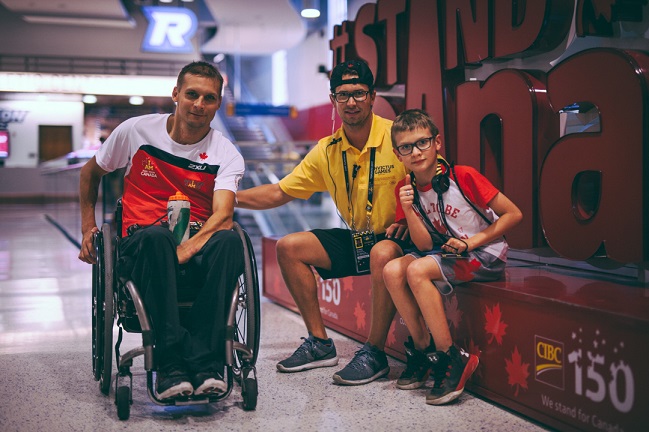
Few people consider playing a contact sport to come back from an injury. Canadian Forces member Chris Klodt is one of those “few people.”
Chris and the rest of the Canadian squad entertained sports fans this week as they took on teams from around the world at the 2017 Invictus Games. The action took place on two fields at Ryerson’s Mattamy Athletic Centre, where wounded warriors sprinted, dribbled and passed their way to Invictus glory. And when that wasn’t enough, chairs clanged hard and loud, players toppled, and the crowd roared in approval.
Chris joined the Canadian Forces on September 11, 2001. “I went to the 2nd battalion PPCLI [Princess Patricia’s Canadian Light Infantry] in Winnipeg, then moved with the battalion to Shilo, Manitoba. I was shot in the neck in 2006 while on patrol. The shot left me a C6 quadriplegic. I was released from the military in December 2014, with a rank of corporal.”
Today, Chris describes himself as a full-time dad of two boys aged 10 and 7, and a wheelchair rugby player with the London Annihilators. “Not a bad gig,” he says with a grin.
“The physio at my rehab showed me the documentary Murderball,” he recalls. “It had just come out in 2006 — an excellent movie. Three years later, I was asked to attend a Solider On function where they were trying adaptive sports. I was lucky enough to get into wheelchair rugby.”
The contact doesn’t phase him, but he tries to be smart about it. “It’s hard to describe [getting hit], because you have to be thinking about the next move too. So you get your hit, but you want to glance and graze [your opponent] enough to stop him and keep going.”
In other words, he doesn’t look for those crowd-pleasing head-on collisions. “You want to keep your wheel speed up and you want keep moving. That’s how you move the ball,” he explains.
Chris waxes philosophical about this year’s results. “We are a young team,” he explains. “There’s only a few of them that were able to make it out to club rugby, so there wasn’t a lot of experience on the floor for us.”
Other teams faced a similar lack of team preparation prior to the Games, but everyone competed hard nonetheless. “I think we did really well for what we had,” Chris adds. “It took a while for us to start clicking, but once we did we started making some gains.”


